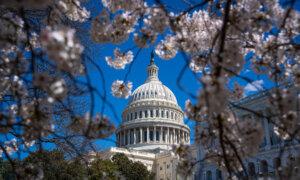Since the bill was narrowly reauthorized by Congress in 2018, a series of abuses have come to light that have thrown the entire process’s future into question.
House Intelligence Committee Chairman Mike Turner (R-Ohio) says he expects a reauthorization of a controversial spying power to pass through the House this week.
House Speaker Mike Johnson (R-La.) is expected to bring Rep. Laurel Lee’s (R-Fla.) “Reforming Intelligence and Securing America” Act, a bill that would make some reforms to the controversial Foreign Intelligence Surveillance Act (FISA), to the floor for a vote.
Mr. Turner appeared on CNN’s “State of the Union” to discuss the scheduled vote in the House this week.
Asked whether he thought the legislation would pass, Mr. Turner replied, “I think it will.”
Ms. Lee’s bill would reform the bill’s controversial Section 702, an authority passed in 2008 that allows intelligence officials to gather information on foreign actors working outside of the United States.
At least, that’s what the rules are supposed to be.
However, since the bill was last reauthorized by Congress narrowly in 2018, a series of abuses have come to light that have thrown the future of the entire process into question.
Though there were fewer the next year, there were still nearly 300,000 illegal queries discovered.
The same mechanism was used to illegally spy on President Donald Trump’s 2016 campaign during the ill-fated Crossfire Hurricane investigation of the president, which was predicated on the false notion that President Trump’s campaign was working with Russia.
In December, lawmakers punted the issue to this month due to longstanding disagreements between Mr. Turner and House Judiciary Committee Chairman Jim Jordan (R-Ohio) on whether a warrant should be required to query Americans’ data.
Notably, Ms. Lee’s proposed reform institutes no such requirement.
Still, the bill does make some modifications to Section 702 policy.
It would primarily strengthen requirements to “ensure that applications to the Foreign Intelligence Surveillance Court … that target United States persons are accurate and complete.”
It also strengthens penalties for illegal queries, imposing a fine or up to 10 years in federal prison for violations.
Finally, it would make it easier for Congress to exercise oversight of the program.
Still, some civil liberty hawks may bristle at the legislation’s lack of a requirement for a warrant—an issue that has united the usually partisan House Judiciary Committee, bringing Mr. Jordan and Rep. Jerry Nadler (D-N.Y.) into a rare moment of agreement.
With bipartisan opposition, the bill is far from being guaranteed to glide through the lower chamber, and could be tanked by a coalition of anti-surveillance conservatives and progressives.
However, Mr. Turner doesn’t see this as likely.
“I think that those who mischaracterize this are small compared to those who understand that this goes to the heart of our ability to get intelligence,” Mr. Turner said. “It allows us to be able to keep Americans safe. This is not a warrantless surveillance of Americans.”
Even if the legislation made it through the House, it could also face roadblocks in the Senate, where Democrats like Sens. Ron Wyden (D-Ore.) and Dick Durbin (D-Ill.) have been outspoken in their condemnation of current Section 702 law.
Original News Source Link – Epoch Times
Running For Office? Conservative Campaign Consulting – Election Day Strategies!


